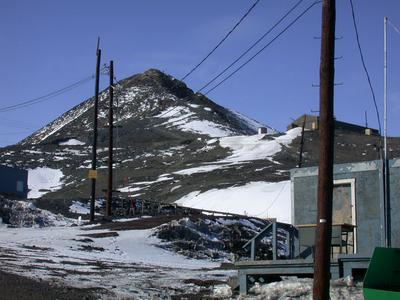
|
|
29 November, 2002
Happy Thanksgiving to all of you back in the States! We won't be celebrating
Thanksgiving until Saturday here in McMurdo. My name is Danny Glavin and for
the past year I have been studying meteorites at the Max-Planck-Institute for
Chemistry in Mainz, Germany. I feel extremely lucky to be part of the 2002-2003
ANSMET team. As part of my thesis research I studied how micrometeorites
collected from the Antarctic ice could have delivered extraterrestrial organic
material to the early Earth, potentially seeding the planet with the building
blocks of life. One meteorite found in Antarctica by ANSMET that has received
an enormous amount of publicity is the Martian meteorite ALH84001. This rock
was blasted off of the surface of Mars millions of years ago by a large impact,
sent flying into space, and eventually landing in the Allan Hills region of
Antarctica about 13,000 years ago. In 1996, a team of scientists from the NASA
Johnson Space Center and the Stanford University claimed to have found evidence
for ancient Martian life in this meteorite. The debate over whether this
meteorite actually contains evidence for life on Mars continues today. My
personal opinion is that a Martian sample return mission that would give us
several pristine "uncontaminated" samples will be necessary to ultimately
resolve the life on Mars debate.
Over the last week in McMurdo I have been trying to find the right words to
describe Antarctica other than simply cold and white. Standing on the ice
sheet at our "shakedown" camp about 12 miles outside of McMurdo I had this
overwhelming feeling of insignificance with miles and miles of ice in every
direction. Although it was a very bright and clear day, distances and
dimensions were very difficult to judge. John Schutt, the recon team leader,
asked me how tall I thought the Transantarctic Mountains were in the distance.
I guessed 5000 feet, but they were actually 14,000 feet!
One of the most important things to be concerned about in Antarctica is
drinking LOTS of water. Keeping your body hydrated is the first defense
against becoming sick. Because it is so dry here, your body loses much more
water than normal. Although I was told to drink between 5-7 liters of water
per day, I didn't drink enough when I first got to McMurdo and eventually
learned this lesson the hard way. A couple of days ago, I started to get a
soar throat, cough and stuffed up nose. After visiting the local hospital here
in McMurdo, I was told that I had picked up the "McMurdo Crud", a type of cold
which is very common in McMurdo this time of year. The flight surgeon at the
hospital prescribed me some medication. I am feeling much better today and I
should be in good shape by the time that we leave for the field on Monday. I
really appreciate the extra help from the other team members so that I could
get some much needed rest.
It has been a pleasure working with the ANSMET team. I know that this has been
said before, but this is a really great group of people. So far everybody is
getting along, but it will be interesting to see if that changes after 6 weeks
in the field.
Danny Glavin

Dante Lauretta convinced me that trimming up before going to Antarctica would give me one less thing to worry about.

A photo of OB "Observation" Hill in McMurdo. The cross seen on the right side near the top of the hill is a memorial to those who have died in Antarctica.
Contact the TEA in the field at
.
If you cannot connect through your browser, copy the
TEA's e-mail address in the "To:" line of
your favorite e-mail package.
|
